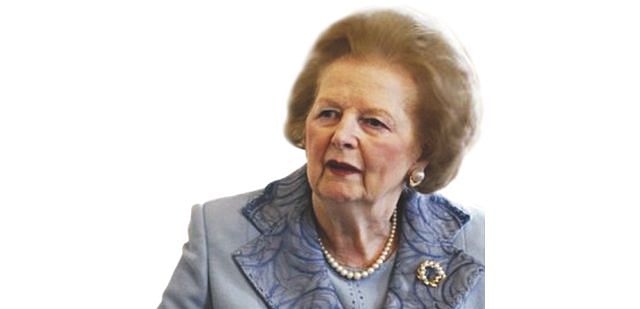Lady not for turning
When Margaret Thatcher was forced out of 10 Downing Street in November 1990 by her party colleagues, former British prime minister Edward Heath cheerfully exclaimed: “Rejoice, rejoice, rejoice!” It was not just a sign of the bitterness Heath continued to demonstrate toward the woman, once his protégé, who had beaten him to the leadership of the Conservative Party in the mid-1970s. It was also a hint of the strong emotions Thatcher aroused among large sections of Britain's people.
In death, Margaret Thatcher is remembered not merely for the divisiveness her opponents have always said she left behind as a legacy but also by the strong leadership she demonstrated in her eleven years in power. There was driving ambition in this child of a working class family. The daughter of a grocer and alderman, Margaret Thatcher made it clear in her youth that politics was a calling she could not turn away from. The journey, begun in the early 1950s, would not end till the beginning of the last decade of the 20th century. She rose to national prominence in 1967 when then Tory leader Edward Heath accommodated her in his shadow cabinet as education spokeswoman. Three years later, in 1970, when the Tories turfed Harold Wilson's Labour out of office, Heath appointed her education secretary in his government. Her firmness in matters of education led to the earliest signs of the controversy she could arouse. Her detractors began to stigmatise her with the sobriquet of 'Margaret Thatcher Milk Snatcher.' She held her ground.
Thatcher's triumph at the elections of 1979 was in many ways a predictable affair, with the governing Labourites going from one crisis to another. The trade unions, led by Arthur Scargill, were not giving the James Callaghan government an easy time. Industrial strikes had pushed Britain towards the brink. Garbage piled up on the streets. Thatcher and her Tories, once the election was over, were regarded by many in British society as people who could pull the country back from the precipice. And they did, through privatision, through emasculating the unions. It was Thatcher's years in power which were to convince a future generation of Labour leaders, the Blair-Brown group, that in order to return to power Labour would need to reinvent itself. An admirer of Thatcher, Tony Blair led Labour back into government eighteen years after the Iron Lady had stormed into Downing Street.
Margaret Thatcher will be remembered for her abrasiveness, for the condescension, if not outright contempt, with which she treated her cabinet colleagues. Indeed, in her time, cabinet government was for the first time seen as a political peculiarity known as prime ministerial government. “The Lady is not for turning”, Thatcher said once. The remark has passed into history as both a sign of firmness and an instance of supreme arrogance. Other expressions from her were to add to the English vocabulary, 'handbagging' for instance. She was a friend and ally of her fellow conservative in America, President Ronald Reagan. Even as the two went headlong into the battle against what they thought was the menace of communism in places as diverse as Afghanistan and Nicaragua, the British leader was not ready to accept the American president's advice for a peaceful, political approach to the Falklands issue. She went to war against Argentina, beat its soldiers hollow and so contributed to conditions that forced the dictator Leopoldo Galtieri out of power.
In the mid-1980s, before he actually assumed charge of the Soviet Union, Mikhail Gorbachev came calling. Thatcher was impressed, famously telling the world that Gorbachev was 'a man I can do business with.' It remains a historical irony that Gorbachev's Soviet Union was to pass into history only a year into Thatcher's departure from office. In 1985, Margaret Thatcher initiated, with Irish Prime Minister Garret Fitzgerald, what is now regarded as a path-breaking Anglo-Irish Agreement aimed at a resolution of the Troubles in Northern Ireland. And yet Thatcher was not seen to be doing enough to convince South Africa's apartheid regime that majority rule had to be conceded. Another irony: Nelson Mandela walked out of prison in February 1990, nine months before Thatcher drove away from Downing Street for the last time.
Margaret Thatcher would have loved staying on in power for as long as she thought she would need to. By 1990, however, fatigue had come into the Conservative Party and rebellion was beginning to rumble among her cabinet colleagues, led by the lately departed senior cabinet member, the lion-maned Michael Heseltine. In the end, Heseltine did not succeed Thatcher. Her loyalist John Major did. But Heseltine caused the fall.
The British are not known to be emotionally demonstrative in public. Thatcher broke with that tradition as she, no more prime minister, stepped into her limousine, waved at newspeople before a residence she had occupied for eleven years, let drop a tear and moved off.


 For all latest news, follow The Daily Star's Google News channel.
For all latest news, follow The Daily Star's Google News channel. 



Comments